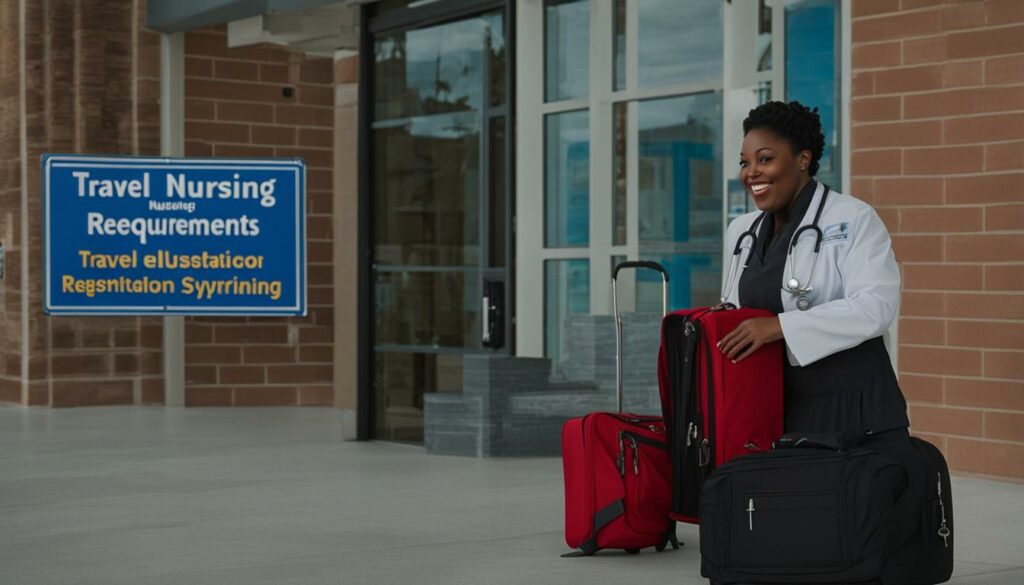Are you a registered nurse looking for an exciting career that allows you to travel while making a difference in the healthcare field? Knowing the travel nursing qualifications is key. Travel nursing might be the perfect fit for you. As a travel nurse, you’ll have the opportunity to work in different locations and explore new places while using your nursing skills and expertise.
But what qualifications do you need to become a travel nurse? Let’s take a closer look at the key travel nursing requirements:
1. Nursing Experience: Before applying for travel nursing positions, you should have at least two years of experience working as a registered nurse. This experience ensures that you have a solid foundation in nursing practice and can handle the challenges that come with working in different environments.
2. Required Certifications: Travel nurses often need to possess certain certifications to qualify for assignments. Basic certifications such as Basic Life Support (BLS) and Advanced Cardiovascular Life Support (ACLS) are commonly required. In addition, specialized certifications like Certified Emergency Nurse (CEN) or Certified Critical Care Nurse (CCRN) can enhance your job prospects and open up more opportunities.
3. Flexibility and Communication Skills: As a travel nurse, you’ll be working in various healthcare facilities that may have different protocols and practices. Being flexible and adaptable is essential to thrive in this role. Moreover, excellent communication skills are crucial for effectively collaborating with different healthcare teams and providing quality patient care.
4. Salary Expectations: Travel nursing offers competitive salaries, with travel nurses typically making around $100,000 per year. However, it’s important to note that salaries can vary depending on factors such as the location and specialization.
Key Takeaways:
- Travel nurses should have at least two years of nursing experience.
- Certifications like BLS and ACLS are commonly required for travel nursing positions.
- Specialized certifications can enhance job prospects and qualifications.
- Flexibility and exceptional communication skills are essential for success as a travel nurse.
- Travel nurses can expect to make around $100,000 per year, but salaries may vary.
What Is a Travel Nurse?
A travel nurse is a valuable asset to the healthcare industry, working through a nurse staffing agency to provide essential medical assistance in various healthcare facilities. These skilled professionals embark on short-term assignments, taking their expertise to different locations across the country or even internationally. With their expertise and flexibility, travel nurses play a crucial role in filling temporary staffing needs and ensuring high-quality patient care.
Working closely with a nurse staffing agency, travel nurses have the opportunity to explore different settings and specialties according to their skills, interests, and preferences. Whether it’s working in a bustling city hospital or a serene rural clinic, travel nurses adapt quickly to new environments, bringing their expertise and compassion to deliver exceptional healthcare services.
The unique nature of travel nursing allows these professionals to gain diverse experiences, honing their skills in various healthcare settings. They work alongside different healthcare teams, collaborating with doctors, nurses, and other healthcare professionals to provide top-notch patient care. This exposure not only broadens their medical knowledge but also enhances their clinical skills, making them well-rounded professionals in the nursing field.
Are you ready to embark on an exciting journey as a travel nurse? Let’s explore the travel nursing requirements and qualifications needed to kickstart your travel nursing career.
What Are the Travel Nursing Requirements?
To embark on a fulfilling career as a travel nurse, there are a few essential travel nursing requirements you need to meet. Here’s what you need to know:
Registered Nurses
To become a travel nurse, you must first obtain the necessary credentials as a registered nurse (RN). This involves completing a reputable nurse training program and passing the NCLEX-RN exam. Once you have successfully cleared these milestones, you will be eligible to apply for licensure.
Clinical Experience
Most travel nursing agencies require a minimum of two years of clinical experience as an RN. This experience equips you with the hands-on skills and knowledge necessary to provide quality patient care in different healthcare settings. By gaining experience in various clinical environments, you’ll be better prepared to adapt to the unique challenges and opportunities that come with travel nursing.
Flexibility and Communication Skills
Flexibility is a crucial trait for travel nurses. As you move from one assignment to another, you’ll need to be adaptable to different work environments, policies, and practices. Additionally, effective communication skills are vital for building rapport with patients, colleagues, and healthcare teams. Strong communication skills enable you to collaborate effectively, provide clear instructions, and ensure seamless care coordination.
By fulfilling these travel nursing requirements, you’ll lay a solid foundation for your travel nursing career, positioning yourself for success in this dynamic and rewarding field.
Travel Nursing Education Requirements
While pursuing a career in travel nursing, it’s important to understand the education travel nursing requirements and qualifications needed to excel in this field. Although there is no specific degree requirement for travel nursing, having a solid foundation in nursing education is essential.
Many travel nursing agencies and healthcare facilities prefer candidates with a Bachelor of Science in Nursing (BSN). A BSN provides a comprehensive understanding of nursing principles, research, and leadership skills. It equips nurses with the knowledge and competencies necessary to deliver high-quality care in diverse settings.
However, it’s worth noting that an Associate Degree in Nursing (ADN) can also qualify someone to become a travel nurse. An ADN program focuses on the fundamentals of nursing practice and prepares students to enter the workforce as registered nurses.
It’s crucial to check the specific travel nursing requirements of the travel nursing agencies or facilities you wish to work with. Some may prioritize candidates with a BSN, while others may accept ADN graduates based on their clinical experience and skills.
Benefits of a Bachelor of Science in Nursing (BSN)
Obtaining a BSN offers several advantages for aspiring travel nurses:
- Expanded knowledge base: A BSN curriculum covers a wide range of topics, including anatomy, physiology, pharmacology, and advanced nursing theories. This broader knowledge base enhances critical thinking and decision-making skills, enabling nurses to provide comprehensive care to patients.
- Competitive edge: With the healthcare industry’s increasing emphasis on higher education, having a BSN can give you a competitive advantage when applying for travel nursing positions. It demonstrates your commitment to professional growth and development.
- Career advancement opportunities: A BSN opens doors to advanced nursing roles, such as nurse educator, nurse manager, or clinical nurse specialist. These positions offer higher salaries and increased responsibility, enabling you to advance your nursing career.

| Associate Degree in Nursing (ADN) | Bachelor of Science in Nursing (BSN) |
|---|---|
| An ADN program typically takes 2-3 years to complete. | A BSN program typically takes 4 years to complete. |
| Focuses on fundamental nursing concepts and clinical skills. | Provides a comprehensive understanding of nursing theories, research, leadership, and management principles. |
| May be accepted by some travel nursing agencies based on clinical experience and skills. | Preferred by many travel nursing agencies and healthcare facilities. |
Travel Nurse Qualifications Checklist
Here is a checklist of essential qualifications for aspiring travel nurses:
- A valid registered nurse (RN) license
- A minimum of two years of clinical experience as an RN
- Excellent communication and interpersonal skills
- Flexibility and adaptability to different work environments
- Relevant certifications, such as Basic Life Support (BLS) and Advanced Cardiovascular Life Support (ACLS)
By meeting these qualifications and investing in your nursing education, you can embark on an exciting journey as a travel nurse, providing care to patients in various locations while expanding your skills and knowledge.
Travel Nurse License Requirements
Becoming a travel nurse requires more than just nursing qualifications and experience. One important aspect is obtaining the necessary licenses to practice in different states. All registered nurses must be licensed in the state where they practice, ensuring that they meet the legal travel nursing requirements and standards set by each state’s nursing board.
For travel nurses, there are two main paths when it comes to licensing: the Nurse Licensure Compact (NLC) and state-specific licensure. Let’s explore these options in more detail:
The Nurse Licensure Compact (NLC):
The Nurse Licensure Compact (NLC) is an agreement among participating states that allows nurses to practice in multiple states without obtaining separate licenses. If you hold a multistate license in one of the NLC states, you can work in any other NLC state without the need for additional licensing.
The NLC offers convenience and flexibility for travel nurses, as they can easily move between participating states without the administrative burden of obtaining new licenses. As of now, 38 states have enacted the NLC legislation, making it accessible to a majority of nurses.
State-Specific Licensure:
While the NLC simplifies the licensing process for travel nurses, not all states participate in the compact. If you plan to work in a state that is not an NLC member, you will need to obtain a state-specific license.
Applying for a state-specific license typically involves submitting an application, providing documentation, and paying the required fees. The specific travel nursing requirements may vary from state to state, so it’s essential to research and understand the licensing requirements of the state where you intend to work.
Temporary Licenses:
In some cases, travel nurses may also need to obtain temporary licenses to practice in certain locations. Temporary licenses allow nurses to work on a short-term basis in states where they do not hold a permanent license or where the NLC does not apply.
The process of obtaining a temporary license usually involves submitting an application, providing proof of licensure in another state or under the NLC, and meeting any additional travel nursing requirements set by the state licensing board.
Summary of Travel Nurse License Requirements
| Licensing Option | Availability | Process |
|---|---|---|
| Nurse Licensure Compact (NLC) | 38 participating states | Hold a multistate license in an NLC state |
| State-Specific Licensure | Non-NLC states | Apply for a license in each specific state |
| Temporary Licenses | Varies by state | Obtain a temporary license for short-term work |
Remember, it is crucial to understand the licensing travel nursing requirements for each state in which you plan to work as a travel nurse. This will ensure that you can legally practice and provide the highest level of care to your patients.
Travel Nurse Certifications
As a travel nurse, it is essential to maintain the same certifications required for other nurses. These certifications not only ensure your competence in providing quality patient care but also open up a wide range of job opportunities and increase your qualifications in the field. The following are some of the key certifications that are highly sought after in the travel nursing industry:
- Basic Life Support (BLS): This certification focuses on the fundamental life-saving techniques that are crucial in emergency situations. It equips you with the necessary skills to respond to cardiac arrest, choking, and other life-threatening conditions. BLS certification is a prerequisite for many healthcare facilities and demonstrates your ability to handle critical situations with confidence.
- Advanced Cardiovascular Life Support (ACLS): ACLS is an advanced certification that goes beyond the basics of BLS. It provides education on cardiovascular emergencies, including stroke, heart attack, and arrhythmias. ACLS-certified nurses are trained to perform advanced interventions and revive patients in critical condition. This certification is highly valued, especially in intensive care units and emergency departments.
- Certified Emergency Nurse (CEN): If you have a passion for emergency nursing, obtaining the Certified Emergency Nurse (CEN) certification can significantly enhance your career prospects. This certification validates your expertise in emergency nursing, including triaging patients, trauma care, and managing critical conditions. It is recognized as a mark of excellence in emergency nursing and is highly valued by employers.
- Certified Critical Care Nurse (CCRN): Critical care nursing requires advanced knowledge and skills to care for patients in critical conditions. The Certified Critical Care Nurse (CCRN) certification demonstrates your expertise in managing critically ill patients, providing specialized interventions, and ensuring optimal patient outcomes in critical care settings. This certification is often preferred by employers in intensive care units and critical care departments.
By obtaining these certifications, you not only expand your knowledge and skills as a travel nurse but also enhance your credibility and desirability among potential employers. Whether it’s providing life-saving interventions, managing emergencies, or delivering specialized care, these certifications showcase your commitment to excellence in nursing practice.
Travel Nursing Qualifications Wrap Up
In conclusion, a career in travel nursing offers numerous benefits and exciting prospects. Travel nurses enjoy the opportunity to earn higher salaries compared to their stationary counterparts while having the flexibility to explore different locations. The demand for travel nurses is high, making it easier for them to secure employment, even in areas experiencing nursing shortages.
Not only does travel nursing provide financial advantages, but it also allows nurses to gain valuable experience in different healthcare settings and specialties. This diverse exposure enhances their skills and broadens their professional horizons. Moreover, travel nursing offers a chance for personal growth and cultural enrichment as nurses immerse themselves in new locations and communities.
If you are a registered nurse looking for an exciting and rewarding career, travel nursing is an excellent choice. With its competitive salaries, flexible lifestyle, and abundant opportunities for growth, a travel nursing career can provide both professional and personal fulfillment. So, consider embarking on this exciting journey to expand your horizons and make a difference in healthcare.
Learn More About Travel Nurse Basics
Travel Nursing 101: Understanding the Basics
FAQ
What are the travel nursing qualifications?
To become a travel nurse, you must have registered nurse qualifications, which include completing a nurse training program, passing the NCLEX-RN exam, and obtaining licensure as a registered nurse. Additionally, most travel nursing agencies require a minimum of two years of clinical experience as an RN.
What is a travel nurse?
A travel nurse is a healthcare professional who works for a nurse staffing agency and takes short-term assignments in various healthcare facilities across the country or internationally. They have the flexibility to work in different settings and specialties based on their skills and preferences.
What are the travel nursing requirements for travel nursing?
The travel nursing requirements for travel nursing include completing a nurse training program, passing the NCLEX-RN exam, and obtaining licensure as a registered nurse. Additionally, travel nurses should have at least two years of clinical experience as an RN and possess excellent communication skills and adaptability to different work environments.
What are the education requirements for travel nursing?
While there isn’t a specific degree requirement for travel nursing, many agencies prefer candidates with a Bachelor of Science in Nursing (BSN). However, an Associate Degree in Nursing (ADN) can also qualify someone to become a travel nurse. It’s essential to check the specific travel nursing requirements of the agencies or facilities one wishes to work with.
What are the travel nurse license travel nursing requirements?
All registered nurses must be licensed in the state where they practice. The Nurse Licensure Compact (NLC) allows licensed RNs to practice in multiple participating states without obtaining separate licenses. However, not all states are members of the NLC, and travel nurses may need to apply for state-specific licenses or temporary licenses to work in certain locations.
What certifications are required for travel nurses?
Travel nurses must maintain the same certifications required for other nurses, such as Basic Life Support (BLS) and Advanced Cardiovascular Life Support (ACLS). In-demand certifications like Certified Emergency Nurse (CEN) or Certified Critical Care Nurse (CCRN) can increase job opportunities and qualifications for travel nurses.
What are the benefits of a travel nursing career?
Travel nursing offers a rewarding career in healthcare with opportunities for higher salaries, flexibility, and the chance to explore different locations. Travel nurses can expect to make around 0,000 per year, although salaries can vary depending on location and specialization. It is a profession in high demand, and travel nurses can find work even in areas with nursing shortages.




